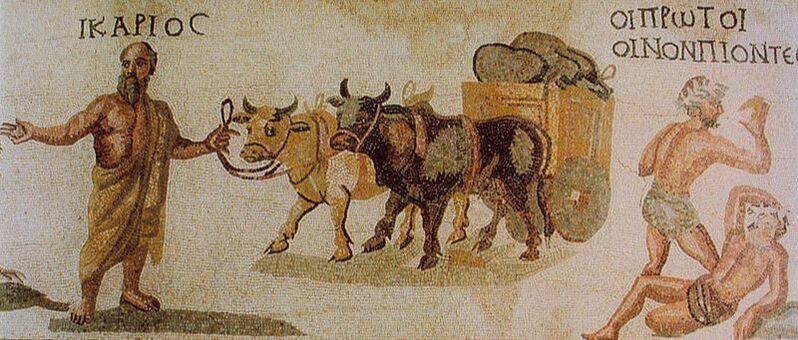ICARIUS OF ATHENS IN GREEK MYTHOLOGY
Icarius was a mortal man of the Athens region who was placed amongst the stars by the gods.
Icarius and Dionysus
Icarius was a simple man, a peasant or farmer who lived in Athens when Pandion ruled. As such, no lineage of Icarius of Athens is recorded, although it is known that he had a daughter known as Erigone; a single source naming Icarius’ wife as Phanothea.
One day, the god Dionysus came to Athens, and Icarius welcomed the god into his home. Dionysus was not always a welcome visitor, but the hospitality of Icarius pleased the god. In gratitude, Dionysus taught Icarius all about winemaking.
Additionally, Dionysus presented to Icarius bags of wine. Icarius then sought to share his newly acquired gifts with his neighbours.
One day, the god Dionysus came to Athens, and Icarius welcomed the god into his home. Dionysus was not always a welcome visitor, but the hospitality of Icarius pleased the god. In gratitude, Dionysus taught Icarius all about winemaking.
Additionally, Dionysus presented to Icarius bags of wine. Icarius then sought to share his newly acquired gifts with his neighbours.
The Death of Icarius
|
One group who partook of the bags of wine were some local shepherds, and these shepherds, who of course had never had wine before, gulped the liquid down.
The shepherds then fell into a drunken stupor. When they came around, the shepherds believed that they had been poisoned, and in retribution stoned Icarius to death. |
|
Or else the murder was committed by the relatives of those who had drunk the wine, the relatives not recognising that they were just unconscious.
Erigone, and the family dog, Maera, would come looking for Icarius, and after a long search, Erigone found her father’s body. Overcome with grief, Erigone hung herself from a tree. The ever-faithful Maera would also die, perhaps by throwing itself into a well.
Erigone, and the family dog, Maera, would come looking for Icarius, and after a long search, Erigone found her father’s body. Overcome with grief, Erigone hung herself from a tree. The ever-faithful Maera would also die, perhaps by throwing itself into a well.
The Revenge of Dionysus
When news of what had befallen his favoured Athenian reached Dionysus, the god of wine, placed Icarius, Erigone and Maera amongst the stars, as Bootes, Virgo and Canis Major.
Dionysus then brought down Madness upon Athens, and the maidens of Athens would hang themselves. A plague was also sent upon the land.
The Athenians would consult with Oracle at Delphi, where the Pythia, told them that the only way to regain favour with Dionysus was to find the bodies of Icarius and Erigone and bury them with honours. The bodies could not be found though, and so instead the Athenians introduced a festival to give honour to Icarius and his daughter, and in this manner Dionysus was appeased.
A less common tale tells of those who had killed Icarius fleeing from Athens, in fear of retribution, and travelled to Ceos. Fleeing Athens though, did not leave behind Dionysus’ wrath. It was left to the newly arrived Aristaeus to discover the reason for the islanders woes. The killers of Icarius were executed, and a shrine to Zeus was erected. The islanders were then told to pray to Zeus and subsequently the Etesian wind would blow.
Dionysus then brought down Madness upon Athens, and the maidens of Athens would hang themselves. A plague was also sent upon the land.
The Athenians would consult with Oracle at Delphi, where the Pythia, told them that the only way to regain favour with Dionysus was to find the bodies of Icarius and Erigone and bury them with honours. The bodies could not be found though, and so instead the Athenians introduced a festival to give honour to Icarius and his daughter, and in this manner Dionysus was appeased.
A less common tale tells of those who had killed Icarius fleeing from Athens, in fear of retribution, and travelled to Ceos. Fleeing Athens though, did not leave behind Dionysus’ wrath. It was left to the newly arrived Aristaeus to discover the reason for the islanders woes. The killers of Icarius were executed, and a shrine to Zeus was erected. The islanders were then told to pray to Zeus and subsequently the Etesian wind would blow.
|
|
Colin Quartermain - Icarius of Athens - 28th August 2021
